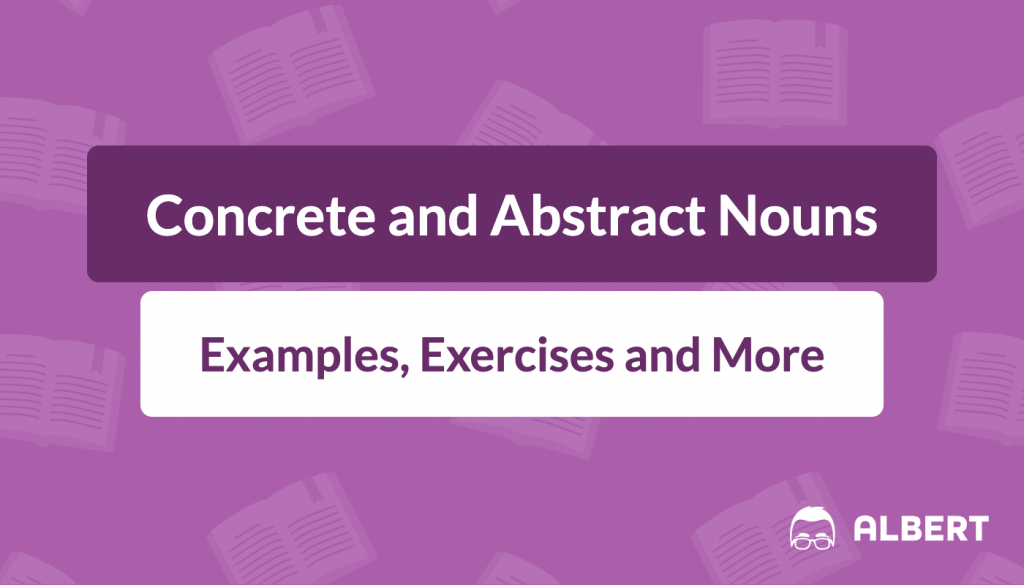What makes some nouns fall under the category of concrete, while other nouns are categorized as abstract?
Read on to learn how to tell the difference between concrete and abstract nouns and when to use each type.
When you’re ready, test yourself with a quiz and practice with our high-quality, standards-aligned questions here.
What We Review
The Basics of Concrete and Abstract Nouns
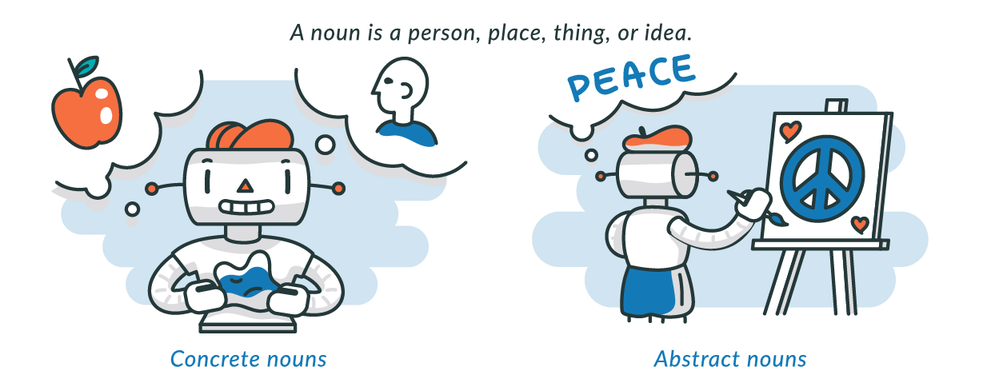
What is a concrete noun?
A concrete noun identifies something material and non-abstract, such as a chair, a house, or an automobile. Think about everything you can experience with your five senses: smell, touch, sight, hearing, or taste. A strawberry milkshake that tastes sweet and feels cold is an example of a concrete noun.
What is an abstract noun?
An abstract noun identifies something immaterial and abstract, such as rest, dread, or transportation. Think about something you can describe but do not experience with your five senses.
Scoring an ‘A’ on a test or sinking the winning basket in a basketball game is what we would all describe as a win, a victory, or a success. But can you really describe any of these nouns using your senses?
Sure, you might be able to feel the rubber basketball as it leaves your hand and hear it “whoosh” through the net. You may be able to see your score on your test and feel the weight of the paper in your hands, but none of these senses can fully capture the meaning of these abstract nouns.

What is the relationship between concrete and abstract nouns?
Concrete and abstract nouns work together to allow us to communicate effectively.
This list, obviously, does not include all common and proper nouns and is meant to be used as a guide while identifying other nouns.
For example, you may have a friend who shares with you that they feel anxious.
You may not be familiar with this feeling, and you are having trouble understanding what your friend is going through because they used an abstract noun. You can ask your friend to describe what anxiety feels like, and often your friend will then use concrete nouns to help you understand more clearly.

Your friend explains that his anxiety feels like a giant rock is pushing on his chest, keeping him from moving. His anxiety also feels like he is trying to cross a busy highway, but there are too many cars quickly passing by, making it impossible for him to cross.
Because your friend used concrete nouns such as rock, chest, highway, and cars, you now have a better understanding of what the abstract noun, anxiety, must feel like. Now you know how to help your friend because using these different nouns together helped you both communicate effectively.
How do you use concrete and abstract nouns?
Concrete and abstract nouns can be used together or separately. Authors use concrete nouns to paint vivid physical descriptions of characters and settings.
For example, in The Hobbit, the author, J. R. R. Tolkien, describes the wizard Gandalf as “an old man with a staff {with} a tall pointed blue hat, a long grey cloak, a silver scarf over a white beard hung down below his waist, and immense black boots” (Tolkien 17).
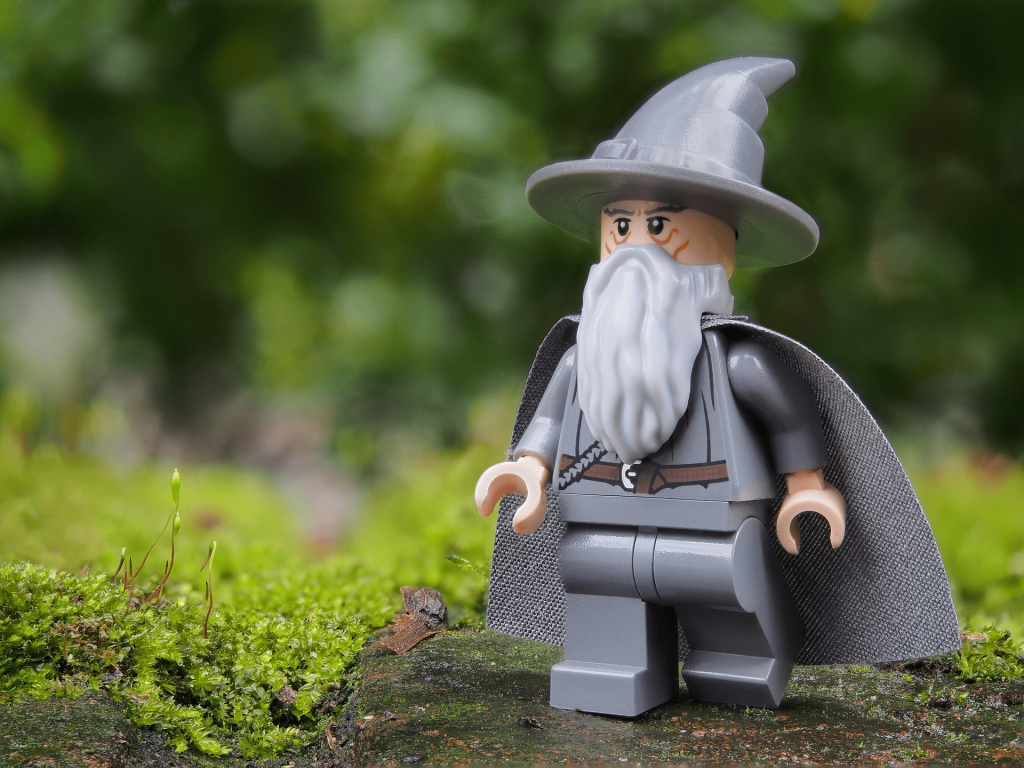
There are several concrete nouns in this sentence that give the reader a picture of what Gandalf might look like. However, to fully understand who Gandalf is apart from just his physical appearance, the author must use abstract nouns as well.
As the story goes on, the reader finds out that some of Gandalf’s strengths are his wisdom and resourcefulness. Both wisdom and resourcefulness are abstract nouns that describe Gandalf further by going beyond Gandalf’s outward appearance.
However, to fully understand these abstract nouns, concrete nouns are needed once again to show the concrete details of how these strengths reveal themselves within the story.
For example, Gandalf’s resourcefulness is shown when he tricks two dangerous trolls into fighting with one another until the sun comes up, which then turns the trolls into stone.
As the trolls argue, Gandalf exclaims, “Dawn take you all, and be stone to you!” (Tolkien 51). When the trolls experience these concrete nouns and see the rising sun turn their bodies into stone, they realize Gandalf’s resourcefulness a little too late.
Return to the Table fo Contents
3 Tips for Understanding Concrete vs. Abstract Nouns
Here are some important tips to help you determine the difference between concrete and abstract nouns:

Tip #1. If you can experience the noun with one of your five senses, it is a concrete noun
- Remember, concrete nouns identify something material and non-abstract, which means we can see, taste, hear, touch, or smell it.
- For example, your brother’s stinky shoes are a concrete noun. You can see them, and you can absolutely smell them.
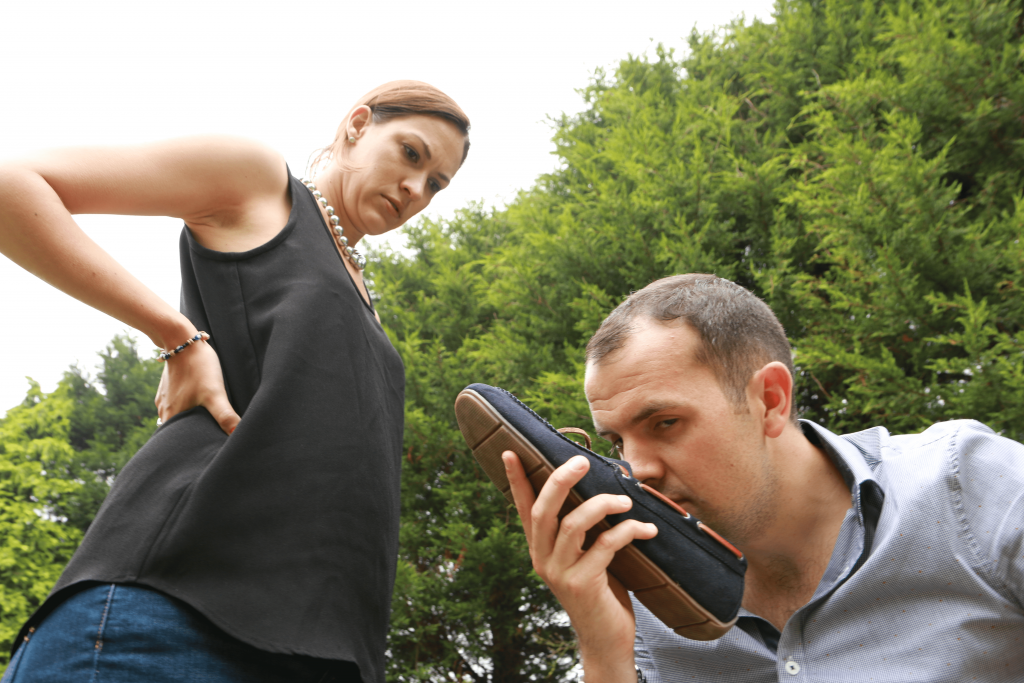
Tip #2. If you cannot experience the noun with one or more of your five senses, it is an abstract noun
- Remember, abstract nouns identify something immaterial and abstract, which means we cannot see, taste, hear, touch, or smell it.
- For example, the word love is an abstract noun. No one ever saw love taking a stroll around the neighborhood with their pet Corgi, but most everyone understands what love is, even if we have various definitions of it.

Tip #3. Concrete nouns can help us better understand the meaning of abstract nouns
- Because we cannot experience abstract nouns with our five senses, it can be difficult to fully understand the meaning of certain abstract nouns.
- Concrete nouns help us understand the meaning of abstract nouns by comparing something immaterial to something material.
- For example, the abstract noun bravery can be better understood by comparing this word to the concrete words and actions of Martin Luther King Jr. Martin Luther King Jr. embodies the abstract noun bravery because people saw his march to protect the rights of all people, people heard his voice speak against the injustice happening to people around him, and people knew his ears were always open to the stories of people who looked up to him.
- While the abstract noun bravery cannot be experienced using our five senses, we can understand its meaning better by using concrete nouns such as march, voice, and ears.

Return to the Table fo Contents
Applying the Basics: Common and Proper Noun Review & Practice
Now that you understand the difference between concrete and abstract nouns, let’s practice identifying both types of nouns.
The Ultimate List of Concrete and Abstract Nouns
Refer to the graphic below for an extensive list of example concrete and abstract nouns:
This list, obviously, does not include all concrete and abstract nouns, and it is meant to be used as a guide while identifying the difference between these two types of nouns.
Return to the Table fo Contents
Concrete Noun Exercises and Review
Now that you know the difference between concrete and abstract nouns, test your ability to accurately identify concrete nouns.
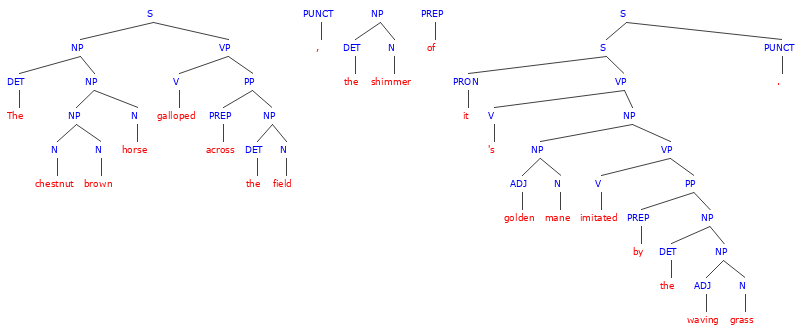
Select the concrete noun(s) in the sentences below. Remember, these nouns identify something material that can be experienced using one or more of the five senses.
1. The chestnut brown horse galloped across the field, the shimmer of it’s golden mane imitated by the waving grass.
- In this sentence, horse, field, shimmer, mane, and grass are all concrete nouns because they can be experienced by one or more of the five senses, specifically, sight.
2. The heat of the sun beat down mercilessly on the soccer players, forcing several players to take a break to drink long gulps of cold water.
- In this sentence, heat, sun, players, gulps, and water are concrete nouns because they can all be seen, tasted, or felt. The noun break is not underlined because it refers to a stop in time and cannot be experienced by one or more of the five senses. Therefore, it is an abstract noun.
3. As she leaned her head outside the window, she could smell the fresh-cut grass and newly-mulched flower beds.
- In this sentence, head, window, grass, and flower beds are all concrete nouns because they can all be seen or smelled.
4. He adjusted the sound on his airpods so that he could hear the violin more clearly.
- In this sentence, sound, airpods, and violin are all concrete nouns because they can be perceived with the senses of sight and hearing.
5. The flames crackled and hissed atop the dry brush, spreading frantically across the forest in smoky gusts.
- In this sentence, flames, brush, forest, and gusts are all concrete nouns. The flames can be seen and heard spreading across the dry branches, and the smoky gusts can be seen, smelled, and even felt as it burns our eyes.
Pro tip: When evaluating whether a noun is concrete, ask yourself, “Can I experience it using one or more of the five senses?”
Return to the Table fo Contents
Abstract Noun Exercises and Review
Now that you know the difference between concrete and abstract nouns, test your ability to accurately identify abstract nouns.
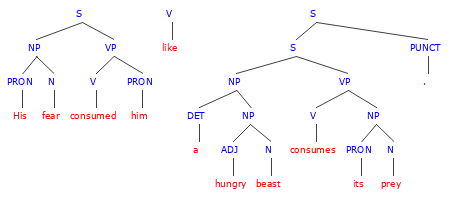
Select the abstract noun(s) in the sentences below. Remember, these nouns identify something immaterial and abstract that cannot be experienced using any of the five senses.
1. His fear consumed him like a hungry beast consumes its prey.
- In this sentence, fear is the only abstract noun because it is the only noun that cannot be experienced using any of the five senses. Other nouns such as beast and prey can immediately be visualized in our minds, making these nouns concrete.
2. Her unwillingness to reach an agreement stalled the proceedings.
- In this sentence, unwillingness, agreement, and proceedings are all abstract nouns that express something immaterial and cannot be experienced using any of the five senses.
3. His worry over the Friday night game consumed him and caused his failure on his biology exam.
- In this sentence, worry and failure are both abstract nouns that identify something immaterial and cannot be experienced using any of the five senses.
4. One of Abraham Lincoln’s goals as president was to end slavery and declare freedom from forced servitude.
- In this sentence, slavery, freedom, and servitude are all abstract nouns because they all represent something immaterial that cannot be experienced using the five senses.
5. In his sonnets, Shakespeare often wrote about love, comparing his subject to the beauty of the natural world.
- In this sentence, love and beauty are both abstract nouns that express something immaterial that cannot be experienced using the five senses.
Pro tip: When evaluating whether a noun is abstract, ask yourself, “Can I experience it using one or more of the five senses? If the answer is no, then the noun is abstract.”
For additional practice, check out Concrete and Abstract Nouns content on Albert.
Return to the Table fo Contents
Try for Yourself: Concrete and Abstract Nouns Quiz

Feeling confident in your understanding of concrete and abstract nouns?
Take this short six-question quiz to see what you’ve learned:
1. Does a concrete noun identify something material or immaterial?
- Answer: Material
- Correct Explanation: That’s right! A concrete noun identifies something material like a car, a ball, or a dog.
- Incorrect Explanation: Sorry, that’s not right! Remember, a concrete noun identifies something material that can be experienced by one or more of the five senses.
2. Does an abstract noun identify something material or immaterial?
- Answer: Immaterial
- Correct Explanation: That’s right! An abstract noun identifies something abstract or immaterial like justice, freedom, or peace.
- Incorrect Explanation: Sorry, that’s not right! Remember, an abstract noun identifies something immaterial that cannot be experienced by any of the five senses.
3. In this sentence, are the underlined words concrete or abstract nouns?
“We will not be satisfied until justice rolls down like waters and righteousness like a mighty stream” (King Jr.).
- Answer: Concrete
- Correct Explanation: That’s right! The nouns waters and stream are concrete because they refer to something material that can be both seen and touched.
- Incorrect Explanation: Sorry, that’s not right! Remember, a concrete noun identifies something material that can be experienced by one or more of the five senses.
4. In this sentence, are the underlined words concrete or abstract nouns?
“We will not be satisfied until justice rolls down like waters and righteousness like a mighty stream” (King Jr.).
- Answer: Abstract
- Correct Explanation: That’s right! The nouns justice and righteousness are both abstract because they refer to something immaterial that cannot be experienced by any of the five senses.
- Incorrect Explanation: Sorry, that’s not right! Remember, an abstract noun identifies something immaterial that cannot be experienced by any of the five senses.
5. In this sentence, are the underlined words concrete or abstract nouns?
The love I have for her knows no limit.
- Answer: Abstract
- Correct Explanation: That’s right! The nouns love and limit are both abstract because they refer to something immaterial that cannot be experienced by any of the five senses.
- Incorrect Explanation: Sorry, that’s not right! Remember, an abstract noun identifies something immaterial that cannot be experienced by any of the five senses.
6. In this sentence, are the underlined words concrete or abstract nouns?
The excited puppy let out a delighted bark as he played contentedly with his red rubber ball.
- Answer: Concrete
- Correct Explanation: That’s right! The nouns puppy, bark, and ball are concrete because they refer to something material that can be both seen and touched.
- Incorrect Explanation: Sorry, that’s not right! Remember, a concrete noun identifies something material that can be experienced by one or more of the five senses.
For additional practice with concrete and abstract nouns, check out our practice on Albert: Concrete and Abstract Nouns.
Return to the Table fo Contents
Teacher’s Corner for Concrete and Abstract Nouns
Concrete and abstract nouns are a foundational, third grade grammar skill according to the Common Core State Standards, the Common Core English Language Progressive Skills Chart shows that even elementary-level skills “require continued attention in higher grades as they are applied to increasingly sophisticated writing and speaking.”
Albert’s concrete and abstract nouns practice can be used for more than just homework! Our assessments can be used as pre-and post-tests to measure student progress. Our pre-made quizzes can be used as bell-ringers, exit tickets, and more!
In addition to our pre-made assessments, you can also use our assignments feature to create your own quizzes and assessments.
Return to the Table fo Contents
Summary on Concrete and Abstract Nouns
Concrete nouns identify something material and non-abstract that can be experienced by one or more of the five senses.
Abstract nouns identify something immaterial and abstract that cannot be experienced by any of the five senses.
Concrete and abstract nouns can be used in tandem with one another or separately. Be sure to check out our grammar course for more concrete and abstract noun practice.
You can also access over 3,400 high-quality questions that address nearly every grammatical concept.
Need help preparing for your Grammar exam?
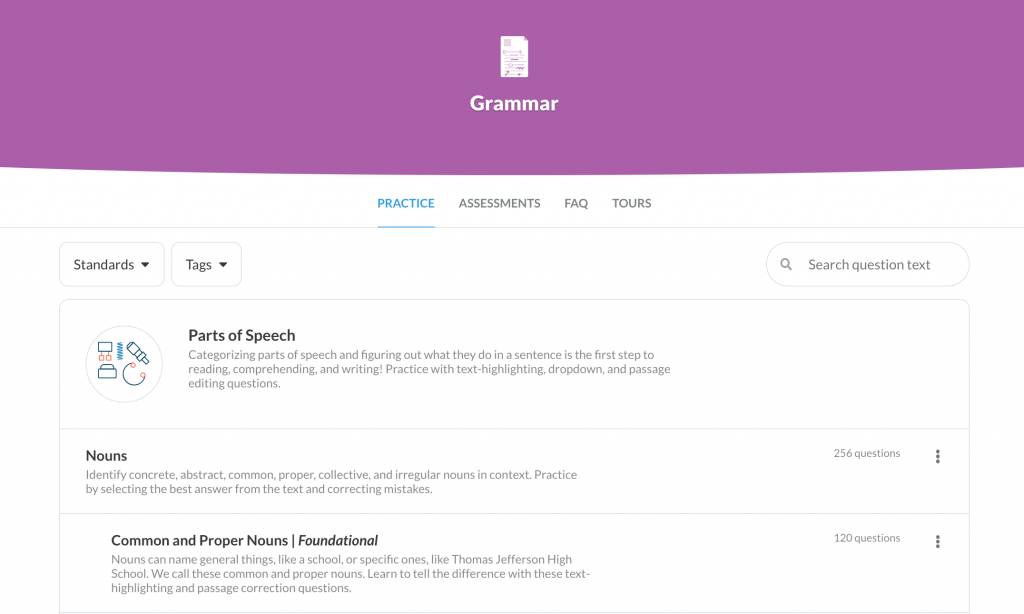
Albert has hundreds of grammar practice questions with detailed explanations to help you master concepts.

